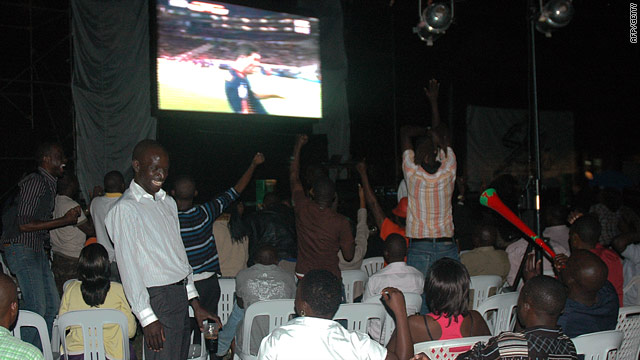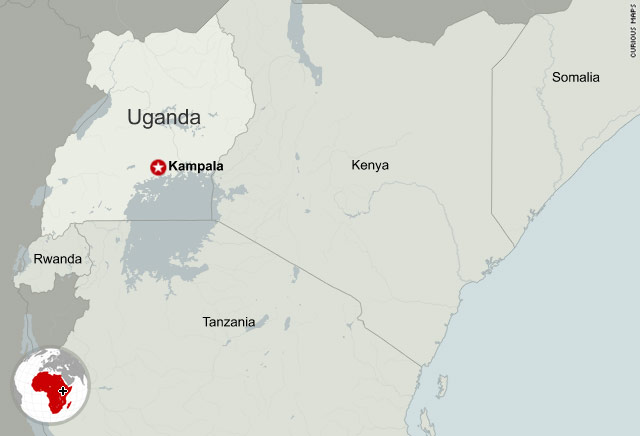
People
watch the World Cup final at a restaurant in Kampala late on July 11,
moments before blasts tore through the crowds.
STORY HIGHLIGHTS
- NEW: Al-Shabaab says it is waging war against "collaborators"
- NEW: Ugandan president declares week of mourning for victims
- Death toll from Uganda bombings at 74
- Group: American killed was working with students
"And the best of men have promised and they have delivered," said an Arabic statement issued by Al-Shabaab's press office and obtained by CNN. "Blessed and exalted among men -- (taking) full responsibility ...We wage war against the 6,000 collaborators; they have received their response."
The 6,000 is an apparent reference to African Union peacekeepers in Somalia. Uganda contributes troops to the peacekeeping effort.
Earlier Monday, Sheikh Abu Al Zubeir, identified as "the Emir of Al-Shabaab in Somalia," said in an Arabic website posting, "My message to the Ugandan and Burundian nations is that you will be the target for our retribution to the massacres perpetrated against the Somali men, women and children in Mogadishu by your forces." The statement was posted on an al-Qaeda affiliated website which previously has carried statements and videos from Al-Shabaab.
The website set up a page Monday to "receive congratulations" on Al-Shabaab's behalf for the "blessed operations" in Uganda.
The three explosions ripped through two Kampala, Uganda, venues where crowds were watching the World Cup final match on Sunday.
Suspicion had centered on Somali Islamist groups shortly after the incident. Islamic militants battling Somalia's U.N.-backed transitional government had previously threatened attacks on Uganda and Burundi, which also contributes troops to the peacekeeping effort in Somalia.
President Yoweri Museveni declared a week of national mourning for victims of the bombings, beginning Tuesday, according to a government statement. All flags on public buildings will be lowered to half-staff during the mourning period, the statement said.
Meanwhile, a journalist in Mogadishu reported that shelling was underway in the city as of Monday night.
Police said more than 70 people were injured in the Kampala blasts.

Map:
Uganda bombings

Video:
Bomb blasts in Uganda capital

Video:
Surviving in Mogadishu
"If you want to fight, why don't you
attack soldiers or military installations instead of fighting innocent
people watching football?" said Museveni, who on Monday visited a rugby
sports center where two of the blasts occurred Sunday.
The blasts
hit in the capital, Kampala, within 50 minutes of each other. The first
one struck an Ethiopian restaurant in a neighborhood dotted with bars
and popular among expatriates; two others exploded at the rugby center.A senior Ugandan government official confirmed there were three bombs. The second one at the rugby club was the most severe, said the official, who was not authorized to speak to the media because of the sensitivity of the situation.
The U.S. Embassy said one American was killed. An organization that works with children in Uganda identified him as Nate Henn.
In a post on its website, the organization -- Invisible Children -- said Henn was in the country working with Ugandan students. CNN could not independently verify the information.
"Nate was not a glory-seeker and never sought the spotlight. He asked not to be made a hero of," the post said. "But the life he lived inspires reflection and imitation."
At least six other Americans were injured.
Mike Hammer, a spokesman for the U.S. National Security Council, said President Barack Obama is "deeply saddened by the loss of life resulting from these deplorable and cowardly attacks." He said the United States is ready to provide assistance to Ugandan officials.
"We wish to condemn the criminality of these attacks," Museveni said. "From a casual look at the scene, I'm confident police will be able to reconstruct the crime scene ... We shall go after them because we know where they come from."
People were
wailing, some were trying to find their relatives, others were trying to
run away from the scene
--Mark Keith Muhumuza
--Mark Keith Muhumuza
RELATED TOPICS
In a government statement, Somali President Sharif Sheikh Ahmed also blamed Al-Shabaab, saying he "condemns in the strongest terms the despicable terrorist acts that killed over 60 people in Kampala."
Ahmed said "the fact that the victims were enjoying the World Cup reveals the evil and ugly nature of the perpetrators and the need to uproot from (the) region those who do not value the sanctity of human life," the statement said.
"The president also denounces the fringe Al-Shabaab terrorist groups (who) rejoice of the carnage and stated that Somalia mourns with the brotherly people of Uganda."
Stone Atwine was watching the game at the rugby center when the blast occurred.
"It happened toward the 90th minute of the game ... this loud explosion," he said. "We didn't know what was happening, we were running around, scampering for safety. I saw dead guys still seated in their chairs with blood."
Atwine said a second explosion struck the venue seconds later, knocking out power.
"At that point, we ran off. My friends and I ran into the car and drove off."
Relatives flocked to hospitals and mortuaries to look for loved ones Monday.
"I was watching the game with my brother at the rugby center," said Ian Lule, who was among a group gathered at a city hospital. "The blast left him unconscious. I don't know how he is."
In the capital, crowds huddled around newspapers, talking in hushed tones.
"Everyone is shocked, everyone is talking about it," said Mark Keith Muhumuza, who was watching the game at a stadium near the rubgy center explosion. "We were in panic mode at the stadium because we thought we would be attacked next."
Muhumuza said when the game ended, he went to the rugby center. "People were wailing, some were trying to find their relatives, others were trying to run away from the scene."
"You can never stop attacks in the world," said FIFA president Sepp Blatter. "During the World Cup, the world should have been touched by the emotions of football. I'm very sad and I was very touched.
"Can you link this to the World Cup? I don't know," Blatter said. "It was when the World Cup was on TV, but it's not for us to investigate a link. But being linked or not to football, we as human beings condemn the attacks ... I deplore what has happened and look forward to the good that football can bring to our world."
The sites of the bombings remained cordoned off as authorities intensified security in the east African nation. Police and military forces patrolled the capital.
"We have more security forces, and are asking everyone to be cautious," Nabakooba said. "We are also asking people to avoid large crowds, but the most important thing is to be cautious."
Some of the injured at the restaurant included six members of an American church mission working with a local congregation, according to the Rev. Kathleen Kind, pastor of Christ Community United Methodist Church in Selinsgrove, Pennsylvania.
All the church members were accounted for and families had been contacted, Kind said. Their injuries ranged from broken bones and flesh wounds to temporary blindness and hearing problems, she said.
Nabakooba called the bombings "definite acts of terrorism."
The African Union summit is scheduled to be held in Kampala next week.
OTHER LINKS
http://edition.cnn.com/2010/WORLD/africa/07/12/uganda.bombings/?fbid=IR9P__h1UDs
http://edition.cnn.com/2010/WORLD/africa/07/12/uganda.bombings.qanda/index.html?iref=obinsite&fbid=IR9P__h1UDs
http://www.youtube.com/watch?v=qtTq2TinHWE
No comments:
Post a Comment